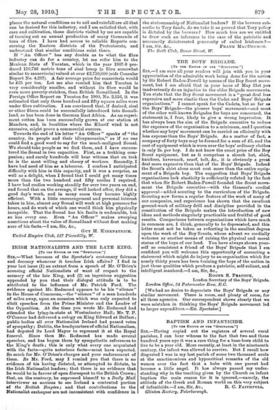THE BOYS' BRIGADE.
[TO THE EDITOR OP THE "SPECTATOR."] SIR, I am sure all your readers will join with you in your appreciation of the admirable work being done for the nation by Sir Robert Baden-Powell by means of the Boy Scout move- ment, but I am afraid that in your issue of May 21st yon inadvertently do an injustice to the older Brigade movements. You state that the Boy Scout movement is a "great deal leas expensive and more elastic than the Cadet and Boys' Brigade organisations." I cannot speak for the Cadets, but so far as the Boys' Brigade—the pioneer boys' movement—and most of the other well-known Brigades for boys are concerned, the statement is, I fear, likely to give a wrong impression. It has always been the aim of the Brigade executive to reduce the expenses of the organisation to a minimum, and I question whether any boys' movement can be carried on efficiently with less expense than the Boys' Brigade. As a matter of fact, a company of forty boys may be formed for a sum of £5, and the cost of equipment which is worn over the boys' ordinary clothes is only 2s. per boy. I do not know the exact price of the Boy Scout equipment, but as it comprises a, slouch hat, shirty knickers, haversack, scarf, belt, &c., it is obviously a great deal more expensive than that of the Boys' Brigade. Indeed the Scout's shirt alone must cost more than the entire equip- ment of a Brigade boy. The suggestion that Boys' Brigade organisations lack elasticity is sufficiently refuted by the fact that when Sir Robert Baden-Powell founded the Scout move- ment the Brigade executive—with the General's cordial approval—added scouting to the curriculum of the Brigade. Scouting now forms a regular feature of the work of many of our companies, and experience has shown that the excellent ground-work of military drill and discipline provided in the constitution of the Brigade makes the introduction of new ideas and methods singularly practicable and fruitful of good results. Comparisons between organisations which have much in common are, I think, generally to be deprecated, and this letter must not be taken as reflecting in the smallest degree upon the work of the Boy Scouts, whose advent we cordially welcome as another means of raising the physical and moral status of the boys of our land. You have always shown your- self so consistent a friend of the Boys' Brigade that I am confident you will welcome this opportunity of correcting a statement which might do injury to an organisation which for nearly thirty years has been training the boys of the nation in just those qualities which produce a patriotic, self-reliant, and intelligent manhood.—I am, Sir, &c.,
ROGER S. PEACOCK,
London Secretary of the Boys' Brigade. London Office, 34 Paternoster Row, E.C.
[We had no desire to depreciate the Boys' Brigade or any similar movement. There is room, and plenty of room, for all these agencies. Our correspondent shows clearly that we were mistaken in thinking the Boys' Brigade movement led to larger expenditure.—ED. Spectator.]














































 Previous page
Previous page